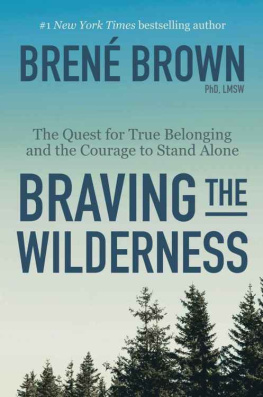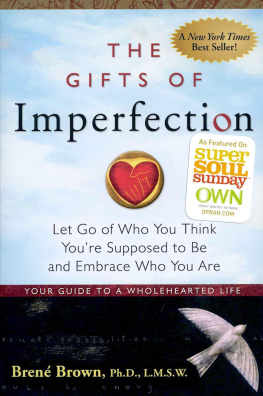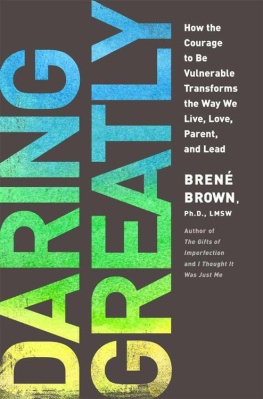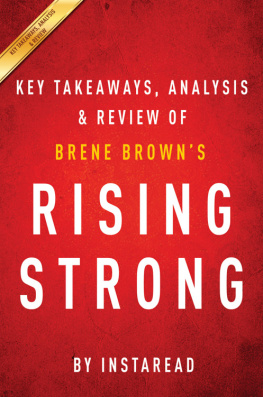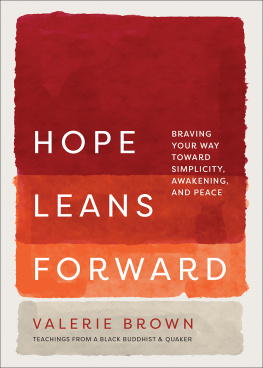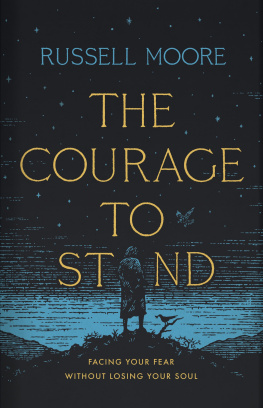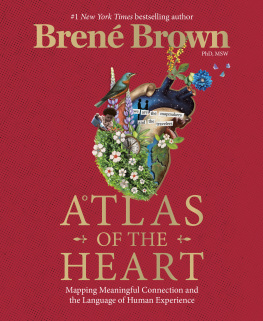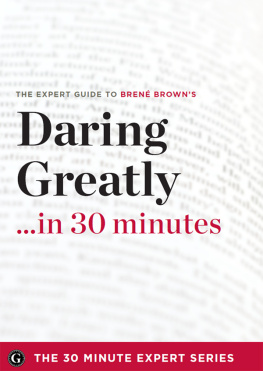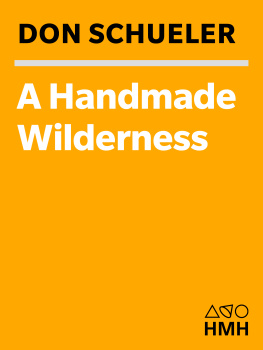Brené Brown - Braving the Wilderness: The Quest for True Belonging and the Courage to Stand Alone
Here you can read online Brené Brown - Braving the Wilderness: The Quest for True Belonging and the Courage to Stand Alone full text of the book (entire story) in english for free. Download pdf and epub, get meaning, cover and reviews about this ebook. year: 2017, publisher: Random House, genre: Home and family. Description of the work, (preface) as well as reviews are available. Best literature library LitArk.com created for fans of good reading and offers a wide selection of genres:
Romance novel
Science fiction
Adventure
Detective
Science
History
Home and family
Prose
Art
Politics
Computer
Non-fiction
Religion
Business
Children
Humor
Choose a favorite category and find really read worthwhile books. Enjoy immersion in the world of imagination, feel the emotions of the characters or learn something new for yourself, make an fascinating discovery.
- Book:Braving the Wilderness: The Quest for True Belonging and the Courage to Stand Alone
- Author:
- Publisher:Random House
- Genre:
- Year:2017
- Rating:3 / 5
- Favourites:Add to favourites
- Your mark:
- 60
- 1
- 2
- 3
- 4
- 5
Braving the Wilderness: The Quest for True Belonging and the Courage to Stand Alone: summary, description and annotation
We offer to read an annotation, description, summary or preface (depends on what the author of the book "Braving the Wilderness: The Quest for True Belonging and the Courage to Stand Alone" wrote himself). If you haven't found the necessary information about the book — write in the comments, we will try to find it.
Braving the Wilderness: The Quest for True Belonging and the Courage to Stand Alone — read online for free the complete book (whole text) full work
Below is the text of the book, divided by pages. System saving the place of the last page read, allows you to conveniently read the book "Braving the Wilderness: The Quest for True Belonging and the Courage to Stand Alone" online for free, without having to search again every time where you left off. Put a bookmark, and you can go to the page where you finished reading at any time.
Font size:
Interval:
Bookmark:


This is a work of nonfiction. Nonetheless, some of the names and personal characteristics of the individuals involved have been changed in order to disguise their identities. Any resulting resemblance to persons living or dead is entirely coincidental and unintentional.
Copyright 2017 by Bren Brown
All rights reserved.
Published in the United States by Random House, an imprint and division of Penguin Random House LLC, New York.
R ANDOM H OUSE and the H OUSE colophon are registered trademarks of Penguin Random House LLC.
Hardback ISBN9780812995848
International edition ISBN9780525508694
Ebook ISBN9780812995855
randomhousebooks.com
Title-page art: borchee/iStock by Getty Images
Chapter-opening art: kovalto1/Shutterstock.com
Cover design: DESIGNHAUS CREATIVE STUDIO
Cover photograph: borchee/iStock
v4.1
ep


W hen I start writing, I inevitably feel myself swallowed by fear. And its especially true when I notice that findings from my research are going to challenge long-held beliefs or ideas. When this happens, it doesnt take long before I start thinking, Who am I to say this? Or, Im really going to piss people off if I call their ideas into question.
In these uncertain and risky moments of vulnerability, I search for inspiration from the brave innovators and disrupters whose courage feels contagious. I read and watch everything by them or about them that I can get my hands onevery interview, every essay, every lecture, every book. I do this so that when I need them, when Im living in my fear, they come to sit with me and cheer me on. Most important, while watching over my shoulder, they put up with very little of my bullshit.
Developing this process took time. In my earlier years, I tried the opposite approachfilling my mind with critics and naysayers. I would sit at my desk and picture the faces of my least favorite professors, my harshest and most cynical colleagues, and my most unforgiving online critics. If I can keep them happy, I thought, or at the very least quiet, Ill be good to go. The outcome was the worst-case scenario for a researcher or a social scientist: findings that were gently folded into a preexisting way of seeing the world; findings that carefully nudged existing ideas but did so without upsetting anyone; findings that were safe, filtered, and comfortable. But none of that was authentic. It was a tribute.
So I decided that I had to fire those naysayers and fearmongers. In their places, I began to summon up men and women who have shaped the world with their courage and creativity. And who have, at least on occasion, pissed people off. They are a varied bunch. J. K. Rowling, author of the Harry Potter books I love so much, is my go-to person when Im struggling with how to introduce a new and strange world of ideas that has only just emerged from my research. I imagine her telling me: New worlds are important, but you cant just describe them. Give us the stories that make up that universe. No matter how wild and weird the new world might be, well see ourselves in the stories.
The author and activist bell hooks comes to the fore when theres a painful conversation happening around race, gender, or class. Shes taught me about teaching as a sacred act and the importance of discomfort in learning. And Ed Catmull, Shonda Rhimes, and Ken Burns stand behind me, whispering in my ear, while Im telling a story. They nudge me when I become impatient and start skipping the details and dialogue that bring meaning to storytelling. Take us with you into that story, they insist. Countless musicians and artists also show up, as does Oprah. Her advice is tacked to the wall in my study: Do not think you can be brave with your life and your work and never disappoint anyone. It doesnt work that way.
But my oldest and most steadfast counselor is Maya Angelou. I was introduced to her work thirty-two years ago when I was studying poetry in college. I read her poem Still I Rise and everything shifted for me. It contained such power and beauty. I collected every Angelou book, poem, and interview I could find, and her words taught me, pushed me, and healed me. She managed to be both full of joy and unsparing.
But there was one quote from Maya Angelou that I deeply disagreed with. It was a quote on belonging, which I came across when I was teaching a course on race and class at the University of Houston. In an interview with Bill Moyers that aired on public television in 1973, Dr. Angelou said:
You are only free when you realize you belong no placeyou belong every placeno place at all. The price is high. The reward is great.
I can remember exactly what I thought when I read that quote. Thats just wrong.What kind of world would it be if we belonged nowhere? Just a bunch of lonely people coexisting. I dont think she understands the power of belonging.
For over twenty years, whenever that quote popped up in my life, I felt a rush of anger. Why would she say that? Thats not true. Belonging is essential. We must belong to something, to someone, to somewhere. I soon realized that the anger came from two places. First, Dr. Angelou had come to mean so much to me that I just couldnt stand the thought that we disagreed on something so fundamental. Second, the need to fit in and the ache of not belonging was one of the most painful threads in my own life. I couldnt accept the idea of belonging nowhere as freedom. Feeling like I never truly belonged anywhere was my greatest pain, a personal suffering that threaded through most of my pre-adult life.
It was in no way my liberation.
Experiences of not belonging are the time markers of my life, and they started early. I attended pre-K and kindergarten at Paul Habans Elementary on the west bank of New Orleans. It was 1969, and as wonderful as the city was and still is, it was a place suffocated by racism. Schools had only become officially desegregated the year I started. I didnt know or understand much about what was happening, I was too young; but I knew that my mom was outspoken and tenacious. She spoke up a lot and even wrote a letter to the Times-Picayune challenging the legality of what today wed call racial profiling. I could sense that energy around her, but to me, she was still just a volunteer in my homeroom and the person who made me, herself, and my Barbie matching yellow plaid shift dresses.
We had moved there from Texas, and that had been hard for me. I desperately missed my grandmother, but I was eager to make new friends at school and around our apartment complex. It quickly got complicated, though. Homeroom lists were used to determine everythingfrom attendance records to birthday party invitations. One day my moms room-mother partner waved the list in front of my moms face and said, Look at all of the black kids on here! Look at these names! Theyre all named Casandra!
Huh, my mom thought. Maybe this explained why I was being left out of so many of my white friends parties. My mom goes by her middle name, but her first name is Casandra. My full name on that homeroom list? Casandra Bren Brown. If youre African American and reading this, you know exactly why white families werent inviting me over. Its the same reason a group of African American graduate students gave me a card at the end of the semester that said, OK. You really are Bren Brown. They had signed up for my course on womens issues and almost fell out of their chairs when I walked to my desk at the front of the classroom on the first day of class. One student said, You are
Font size:
Interval:
Bookmark:
Similar books «Braving the Wilderness: The Quest for True Belonging and the Courage to Stand Alone»
Look at similar books to Braving the Wilderness: The Quest for True Belonging and the Courage to Stand Alone. We have selected literature similar in name and meaning in the hope of providing readers with more options to find new, interesting, not yet read works.
Discussion, reviews of the book Braving the Wilderness: The Quest for True Belonging and the Courage to Stand Alone and just readers' own opinions. Leave your comments, write what you think about the work, its meaning or the main characters. Specify what exactly you liked and what you didn't like, and why you think so.

